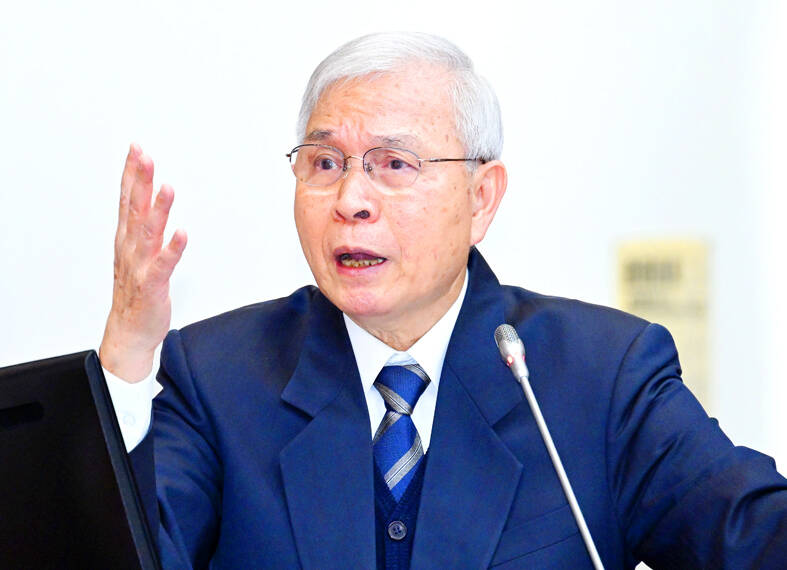The central bank spent a record amount of money defending the New Taiwan dollar last year and might need to do more, given worsening stock market outflows and escalating trade tensions.
Central bank Governor Yang Chin-long (楊金龍) presented a report to legislators yesterday morning, saying that the central bank sold US$16.4 billion on a net basis in the foreign exchange market last year. The US dollar sales were a third year in a row and the most since 2018.
“Together with Trump 2.0-induced uncertainties, concentrated and massive short-term foreign capital flows bring challenges to the stability of our foreign exchange market,” the report said.

Photo: Liao Chen-hui, Taipei Times
The New Taiwan dollar declined more than 6 percent against the US dollar last year, extending its losing streak to three years. It has fallen another 0.5 percent this year amid the worst-ever selling streak by foreign investors in its stock market as heavyweight Taiwan Semiconductor Manufacturing Co (TSMC, 台積電) fell out of favor.
Foreign investors are increasingly influential for Taiwan’s equities, as an artificial intelligence (AI) frenzy led to a surge in demand for TSMC. The market value of local stocks owned by global funds expanded to 142 percent of the nation’s foreign reserves as of the end of last month, from 69 percent in 2016, the latest central bank data released on Wednesday last week showed.
Still, foreign investors have reduced holdings of Taiwanese equities for the past 12 sessions, shedding a net NT$391 billion (US$11.9 billion), according to exchange data compiled by Bloomberg. They sold a net US$19.5 billion worth of stocks last year.
Shares of TSMC, which accounts for more than a third of the Taiwanese benchmark’s weighting, have fallen about 10 percent this year.
When asked by lawmakers yesterday, Yang toned down the currency impact of TSMC’s latest plan to invest another US$100 billion in its US facilities.
“TSMC doesn’t need to buy US dollars from the forex market, as the money it earned is enough to fund its overseas investment,” Yang said.
Separately, the central bank expects inflation this year to be stable at around 2 percent, though adding it could revise the forecast upward if prices of electricity and railway tickets rise.
“We need to be more concerned about uncertainties over inflation and the economy,” Yang told lawmakers.
Predictions for the consumer price index (CPI) growth rate this year by major financial institutions range from 1.70 percent to 2.30 percent, with an average of 1.95 percent, according to the central bank’s report.
The central bank in December last year predicted that the CPI growth rate would be 1.89 percent this year, which had been above the 2 percent inflation warning threshold for three consecutive years through last year.
Additional reporting by CNA

Micron Memory Taiwan Co (台灣美光), a subsidiary of US memorychip maker Micron Technology Inc, has been granted a NT$4.7 billion (US$149.5 million) subsidy under the Ministry of Economic Affairs A+ Corporate Innovation and R&D Enhancement program, the ministry said yesterday. The US memorychip maker’s program aims to back the development of high-performance and high-bandwidth memory chips with a total budget of NT$11.75 billion, the ministry said. Aside from the government funding, Micron is to inject the remaining investment of NT$7.06 billion as the company applied to participate the government’s Global Innovation Partnership Program to deepen technology cooperation, a ministry official told the

Taiwan Semiconductor Manufacturing Co (TSMC, 台積電), the world’s leading advanced chipmaker, officially began volume production of its 2-nanometer chips in the fourth quarter of this year, according to a recent update on the company’s Web site. The low-key announcement confirms that TSMC, the go-to chipmaker for artificial intelligence (AI) hardware providers Nvidia Corp and iPhone maker Apple Inc, met its original roadmap for the next-generation technology. Production is currently centered at Fab 22 in Kaohsiung, utilizing the company’s first-generation nanosheet transistor technology. The new architecture achieves “full-node strides in performance and power consumption,” TSMC said. The company described the 2nm process as

Shares in Taiwan closed at a new high yesterday, the first trading day of the new year, as contract chipmaker Taiwan Semiconductor Manufacturing Co (TSMC, 台積電) continued to break records amid an artificial intelligence (AI) boom, dealers said. The TAIEX closed up 386.21 points, or 1.33 percent, at 29,349.81, with turnover totaling NT$648.844 billion (US$20.65 billion). “Judging from a stronger Taiwan dollar against the US dollar, I think foreign institutional investors returned from the holidays and brought funds into the local market,” Concord Securities Co (康和證券) analyst Kerry Huang (黃志祺) said. “Foreign investors just rebuilt their positions with TSMC as their top target,

POTENTIAL demand: Tesla’s chance of reclaiming its leadership in EVs seems uncertain, but breakthrough in full self-driving could help boost sales, an analyst said Chinese auto giant BYD Co (比亞迪) is poised to surpass Tesla Inc as the world’s biggest electric vehicle (EV) company in annual sales. The two groups are expected to soon publish their final figures for this year, and based on sales data so far this year, there is almost no chance the US company led by CEO Elon Musk would retain its leadership position. As of the end of last month, BYD, which also produces hybrid vehicles, had sold 2.07 million EVs. Tesla, for its part, had sold 1.22 million by the end of September. Tesla’s September figures included a one-time boost in